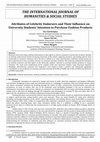Papers by Deo Sabokwigina

The International Journal of Humanities & Social Studies
Marketers have been using celebrity endorsement in their efforts to attract consumers towards the... more Marketers have been using celebrity endorsement in their efforts to attract consumers towards their products. Benefits of celebrity endorsement include increasing awareness of the advert; capturing attention; and making adverts more memorable to consumers. However, there has been a debate as to what characteristics celebrities should possess for their endorsement to have a positive outcome on consumer purchase intention. This study has analyzed the attributes of celebrity endorsers and their effect on the University students' intention to purchase fashion products in Iringa, Tanzania. The study used confirmatory factor analysis (CFA) and regression analysis using Structural Equation Modelling. Attractiveness, expertise and congruence were found to make a positive and statistically significant contribution to the prediction of consumer purchase intention (β=0.384, p=0.009), (β= 0.342, p=0.003) and (β=0.373, p=0.006) respectively.

2016 IST-Africa Week Conference, 2016
This study investigated the usage of non-cash payments through m-money services among students of... more This study investigated the usage of non-cash payments through m-money services among students of the University of Iringa in Tanzania. A convenient sample of undergraduate students and business operators within and around the University campus was used. It was found that 80% of utility shops accepted noncash payments through m-money, business operators were optimistic about the service although there were challenges related to transaction costs and network/sending errors. Approximately 81% of respondents frequently received money from their sponsors/relatives through their m-money accounts. About 63% of respondents made regular savings deposits on their mobile phones unlike their bank accounts. Over 60% used m-money services for non-cash payments and savings deposits. This has a significant implication for the recent movement from predominantly cash to non-cash payments as subscribers directly pay for their purchased items through their mobile phones without necessarily having cash at hand. Practical recommendations and a direction for further study are provided.

The rapid increase of the use of mobile phones has created a new channel for marketing. The use o... more The rapid increase of the use of mobile phones has created a new channel for marketing. The use of Short Messaging Service (SMS) has become more important to access potential customers through their mobile phones. The new advertising platform, which is termed ‘mobile advertising’, refers to any communication about products, services, and ideas using mobile phones for promotional purposes. This study examines the factors that affect consumer attitudes towards SMS advertising and the relationship between these factors and attitude. The study used a survey of Tanzanian University students who are mobile phones users. The results, conducted on 260 students who are mobile phone users, showed that Informativenss and credibility were found to uniquely, significantly and positively influence the prediction customers attitude towards advertising SMSs (ß=0.22, p=0.000) and (ß= 0.129, p=0.022) respectively while irritating and frequency were found to uniquely, significantly and negatively infl...
Team Academy in Diverse Settings
International Journal of Entrepreneurial Behavior & Research
In this paper, a case has been made for a wider adoption of entrepreneurial teaching and learning... more In this paper, a case has been made for a wider adoption of entrepreneurial teaching and learning approaches in Tanzania. It makes a brief review of entrepreneurial pedagogical approaches and its status of implementation in selected institutions of Higher Learning in the country. The paper urges for an adoption of the approach in order to expedite the Nation's economic prosperity through linking universities and industries and making its people better prepared to cope in a world becoming increasingly competitive and knowledge based.

This study investigated the usage of non-cash payments through m-money services among students of... more This study investigated the usage of non-cash payments through m-money services among students of the University of Iringa in Tanzania. A convenient sample of undergraduate students and business operators within and around the University campus was used. It was found that 80% of utility shops accepted non-cash payments through m-money, business operators were optimistic about the service although there were challenges related to transaction costs and network/sending errors. Approximately 81% of respondents frequently received money from their sponsors/relatives through their m-money accounts. About 63% of respondents made regular savings deposits on their mobile phones unlike their bank accounts. Over 60% used m-money services for non-cash payments and savings deposits. This has a significant implication for the recent movement from predominantly cash to non-cash payments as subscribers directly pay for their purchased items through their mobile phones without necessarily having cash at hand. Practical recommendations and a direction for further study are provided.

The rapid increase of the use of mobile phones has created a new channel for marketing. The use o... more The rapid increase of the use of mobile phones has created a new channel for marketing. The use of Short Messaging Service (SMS) has become more important to access potential customers through their mobile phones. The new advertising platform, which is termed 'mobile advertising', refers to any communication about products, services, and ideas using mobile phones for promotional purposes. This study examines the factors that affect consumer attitudes towards SMS advertising and the relationship between these factors and attitude. The study used a survey of Tanzanian University students who are mobile phones users. The results, conducted on 260 students who are mobile phone users, showed that Informativenss and credibility were found to uniquely, significantly and positively influence the prediction customers attitude towards advertising SMSs (β=0.227, p=0.000) and (β= 0.129, p=0.022) respectively while irritating and frequency were found to uniquely, significantly and negatively influence the prediction customers attitude towards advertising SMSs (β= -0.269, p=0.000) and(β=0.265, p=0.000).











Uploads
Papers by Deo Sabokwigina